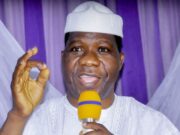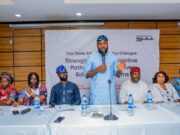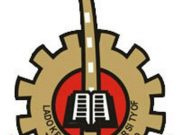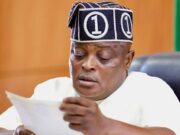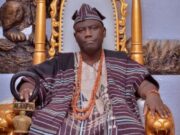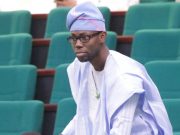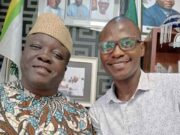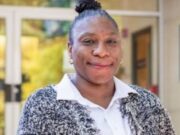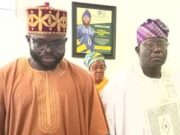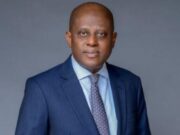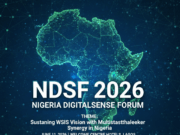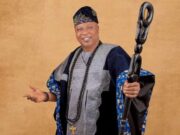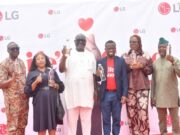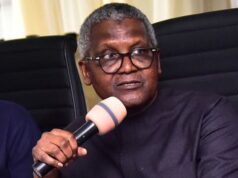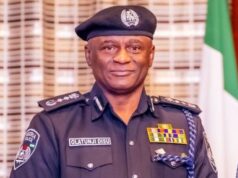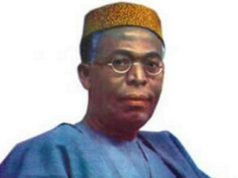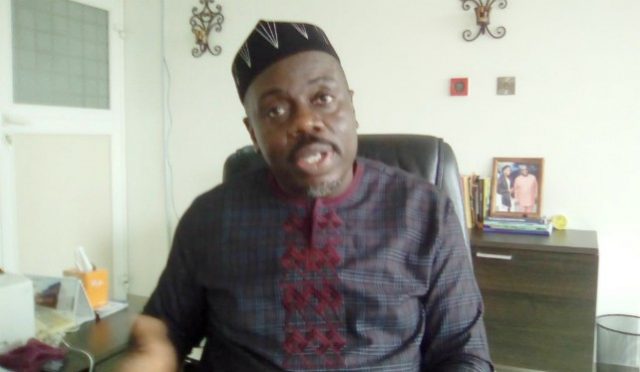
In this interview with the PMParrot/Parrot Xtra team led by OLAYINKA AGBOOLA, the Director General at the Development Agenda for Western Nigeria (DAWN Commission) Seye Oyeleye spoke on how the organization has been working to ensure that the Yoruba States attain the status they had decades back when they were at the zenith of their glory in the days of the Western Region.
He spoke on the steps the Commission has taken to achieve the mandate as well as the challenges they have had to cope with. Excerpts:
Thank you for agreeing to speak with PMParrot.com/Parrot Xtra Magazine. Please can you introduce yourself to our readers?
I am Oluseye Oyeleye, the Director General for the DAWN Commission. DAWN Commission means Development Agenda for Western Nigeria. I became the substantive Director General at the end of March 2018. Prior to that, I was in acting capacity after the demise of the pioneer D.G, Late Mr. Dipo Famakinwa, who sadly passed on last year. We can also say that I was the number two staff at the DAWN Commission. Late Dipo was the first. The commission itself took off in July 2013, coincidentally; we clocked five years last month. But I came into DAWN in June 2013.
Please, can you tell us about your childhood – how you grew up?
I was born in England 51years ago, came back to Nigeria and did an early schooling in Lagos before my parents finally came back to Ibadan in 1975 and I had my primary school education at Alafia Nursery and Primary school owned by Mrs. J.E Bolarinwa, and after that, I proceeded to Loyola College, Ibadan and later to the defunct Oyo State School of Arts and Science, Ile Ife for my A-Levels. I later moved to the Obafemi Awolowo University Ile-Ife where I graduated with B.A Hons, in History, I did my youth service in Lagos and then proceeded to England for my Masters in International Studies and Strategic Studies, and started my working career fully. For 18 years, I worked in the private and the public sector in England rising to the position of a senior manager in Local Government, also I worked as an IT programmer for few years. I was in England for the better part of 18 years before coming back to Nigeria basically to contribute my own quota to the growth of our region and country. I feel it’s the right time to come back, and since then, it has been an interesting journey.
Coming back home, I worked with Omatek Computer Manufacturing Company; the first indigenous computer manufacturing company in Nigeria. I was previously the head of HR and Admin and later I moved to TY Danjuma Foundation in Abuja. I was the Group Head of Strategy for the foundation. From there I came to DAWN in June 2013, I started at DAWN as the Coordinating Head for Homeland Affairs.
Tell us more about the DAWN Commission.
The DAWN Commission is the creation of the six South Western states of Nigeria – these are Oyo, Osun, Ondo, Ogun, Lagos and Ekiti states. The job of the Commission is to integrate the six states. The Idea of DAWN itself started long before the Commission took off. Let me explain further – in 2010, a group of Yoruba intellectuals, businessmen, academicians – the eggheads came together with a common theme and question of what would become the fate of the Yoruba states in case the oil money from Abuja stops coming in. These concentrated minds discussed about the way the Western Region depended solely on a commodity and which makes us rely solely on Abuja before we can feed ourselves and this made us to come up with our position via policy papers.
The idea was how the six states would work together for a common good – and we had earlier agreed that instead of us to finding ways to harness our resources together we were working separately. This, of course had its benefits, but we felt we could move at a greater speed by agreeing to come together to collaborate on critical issues. This brought about the policy papers that were submitted in the period of three years – in 2010, 2011 and 2012. This culminated in the DAWN Commission Strategic Roadmap, a document that was prepared and presented to the Governors of the six Western States in October 2011. That it is the way forward for the six Western states in the region and they all adopted it.
The six Governors came together in Lagos and adopted the document as the roadmap for the future of the Western states of Nigeria represented by the six Western states. At the meeting they reached a conclusion that they would set up a commission to midwife the process of working together, it gave birth to the DAWN Commission and was pronounced in 2012 and in 2013 it kicked off and Cocoa House was chosen as our office because of its significant status as it shows the height of our powers in Africa. As at then, it was the second tallest building in Africa and Ibadan as the political base for all affairs in the old Western Region. That’s how it started and since then I have been here.
Can you enumerate the achievements of the Commission since inception?
The six states are now communicating as one region; this was not happening before the advent of DAWN, but now the six states are working for a common goal. I must say the balkanization of the country did us more harm than good in that respect. The six states were working separately until we came. Look at the Northern states, as divided as they might be, when they are going to Abuja; they go there as a bloc to ask the Federal Government what it has for them. The coming of the DAWN Commission made the six states of the Yorubas to have a common platform to collate their views and push them forward. They all now do things together, so that is the major achievement of DAWN Commission.
In the area of agriculture, the six states of the region have their own agricultural policies but failed to optimize their benefits from Abuja the centre. In the area of agriculture we have not been benefitting from the money the Federal Government puts on agriculture and to tap from this, we look at our strength and approached the Federal Government and we are working with relevant agencies to further facilitate things. Look at cocoa, we did a study and a research on cocoa to see the benefits and we carried out a study for about nine months and we were able find out ways to bring cocoa back as our economic mainstay; you know it used to be our mainstay before oil came. We are collaborating with NISER to get funds to facilitate this. NISER is the agricultural lending body that was set up by the Federal Government to provide funds for Agriculture.
In the area of rice growth we have worked tirelessly. When we talk about rice growth, we all think about the Northern states but no one knew we could grow rice here. Lagos went into partnership with Kebbi State on rice production -it was for the production of LAKE Rice but we told the Lagos State Government that instead of going to Kebbi to buy LAKE Rice, we would supply large quantity of rice to them. Then, we later found out that the state had invested heavily in its rice processing factory and they needed rice to feed these mills, we helped LASG to facilitate the leasing of land from other south west states and Lagos would fund the planting and the farmers there will do the planting so it is a win- win situation. All the remaining five states pledged to give out 42 acres of land and an MOU was signed and all the legal work done in that effect. And after planting, Lagos acts as the off takers, they buy from the planting states. In this region we grow upland and lowland rice and we are seriously talking to Rice Farmers Association of Nigeria [RIFAM], we are discussing on how the project can be done and we also try to get NISER involved, they provide irrigation in the north, but our own need is money to do the land clearing, our acres need to be cleared.
Here in the South-West our acres of land are very expensive to clear. It takes about N300,000 to clear an acre of land. This is the capital we need because some of these states gave us virgin lands about a month ago. We have started talking to NISER to provide funds, the six Governors have already signed. Lagos Rice Mill will be the biggest in Africa by the time it starts to work at full operation next year January. Again that was facilitated by DAWN – our job here is to show that the region is open for business and we have the capability to provide these things for the region. We will make sure that the six states benefit from the rice boom the federal government is talking about. The N100 billion investment of the Federal Government should benefit all of us.
In the technical area, the Western Region used to be the base of the Civil service in Nigeria – we can all remember the days of the Simeon Adebos of this world, the civil service used to be fantastic but what we are doing now is that we are talking to our technical partners on how to try to train our civil servants, how to make their job easier and we are doing a kind of consultation on how to come up with a common syllabus to improve their standard. We plan to institute a situation that will ensure that the kind of standard they have in Ondo will be obtainable in other Western states. States like Ogun State have adopted the idea and the reforms are being carried out. This standard will outlive the present administration of Senator Ibikunle Amosun.
In the area of sports, we organized the DAWN Games in 2014 in Lagos and another one is coming up in 2019 in Lagos. Also, we have Education Reforms; in fact, we have had two major roundtable discussions on that and we are also trying to have a common curriculum of instruction like the one on our local language. We want a common language of instruction for our schools all over the Western Region. We don’t execute projects but we are the think-tank for government and we make sure our ideas are implemented.
Also, our pet programme, ‘The Conversation on Yoruba History’ made us realize that most of our young ones and middle aged do not know about our historical background, some do not even know of late Chief Moshood Kashimawo Olawale Abiola (MKO), the presumed winner of the annulled June 12, 1993 presidential election, not to talk of Chief Obafemi Awolowo and the likes of the Ooni Adesoji Aderemis of this world. The focus of the Yoruba Historical Conversation is to make sure our history does not die. We bring historians and ask them to pick an important topic and discuss monthly or bi-monthly, our historians treat these topics and we post on social media. And soon we will compile the lectures into a compendium and give it out to all the schools in the six states free and presently we have taken the discourse to the House of Chiefs at the Oyo State Secretariat in Ibadan. This is also because of its symbolic status. Equally, the six Yoruba states have reached us to request that the Liberty Stadium in Ibadan be given back to the six Yoruba states to be the region’s center of sporting excellence as it used to be and a letter has been sent to Abuja on that and we are waiting for their response.
Some prominent Yoruba sons and daughters have been calling for the holding of what they called Security Summit to put the rampaging Fulani herdsmen in check. What is your take on this as Commission? What of the issue of allocation of land for ranches for these herdsmen?
This issue has been totally politicized; from some information we got, you will be surprised that not all of them are herdsmen but mostly sponsored by politicians. Are you saying ranches for all or just for the Fulanis? On this issue we need to walk away from that hysteria that we would not agree to grazing in southwest and put on our thinking cap. We think from an economic angle – let’s look at the economic gains of this issue; if Government says no to ranching in the South West but can we stop these people from coming to the South West? Are we going to stop eating meat? If Government can give the South-western people the go ahead to invest in ranching and cattle rearing which is a part of agriculture, if Government is spending N150 billion on agriculture, we should look at the way we can benefit. We cannot bar these people from our land, they have been part of us, we too can decide to own ranches by ourselves if we are afraid they will take over our lands if we allow them to bring their ranches here then we can work with them or go fully into the business ourselves. The cattle business according to the information at our disposal is worth over one trillion naira annually and we are working on presenting a policy paper to the government on that. Herdsmen’s killing is not our only problem; also we have kidnapping and other problems. See our waterways, but I hail the agreement of government to start the state police and it will give us a solution to these myriads of security problems in the country.
In the South West we need to brainstorm on how the region will have a central control area, a central command for the six states and raise the standard of recruiting intelligent agile men and women for the state police. We need better qualified people for the Police Force and we at DAWN are working with experts to raise a policy paper on that.
Funding of the commission, how easy is it?
The six states of the South West are the sponsors and all of them are committed to this Commission. They contribute by funding and supporting and they try to make our work effective. You know we don’t play politics and this is the beauty of it. DAWN Commission has been in existence before the coming of these Governors, so they fund us but we also create other ways to get funds. We cannot wait on Governments alone for funding; we apply to foreign funders and Yoruba community in the Diaspora for support.
Can you speak about some of the major challenges you are facing?
Our challenges are not just about money alone. We also face problems of getting approval from these states to execute projects. It takes a long time to get approval from individual states but if it is the collective thing it will be faster. Thank God for the committed staff we have here, they are very passionate about the commission and it has been helping. DAWN Commission, by the grace of God, was instrumental to the bringing of Lagos into the Oodua Investment Group; the struggle which started in 1948 was finally facilitated by DAWN Commission. The Western Region needs to merge into a regional bloc to harness benefits from the centre and DAWN has taken a lead on that. We call on our people in the Diaspora to look for ways to help us in the area of funding; some of our people in Canada are ready to help us train our civil servants in November this year.
We call on people from this region living outside this country to come and tap opportunities by investments here. Our lines are open, they can call, we have a desk that takes care of Diaspora investments here at DAWN, we are open to facilitate projects.
Presently we plan to have a youth employability and entrepreneurship training by October 2018. It is going to be a two-day summit so we can have youths that are employable and we are doing this in collaboration with the Bank of Industry (BOI); we are going to train them on skill acquisition, make them skillful even before going to the University they would have already known what they want to do with their hands.
In Germany they don’t welcome paper certificate, they prefer graduates with skills. The establishment of The Technical University, Ibadan by the Oyo State Government is a very good achievement and I praise whoever gave the Governor the idea.
Governor Ajimobi’s move has placed Oyo State on a different pedestal. He has set a pace for others to follow. Youths will not just get educated, they will now be educated to be useful to themselves and the nation.
Presently we are training students on how to write computer codes, this year in Lagos, we are training youths and retraining them. My belief is that any youth that is empowered and has something upstairs will not be available at all for anybody, including politicians to be used for dirty jobs.
A youth that has a skill and small scale project at hand will not be ready to carry out hatchet man’s job for politicians for N1,000. He will ask questions. This will in turn sanitize our politics. As you can see, the bar is being raised in the South West already.








